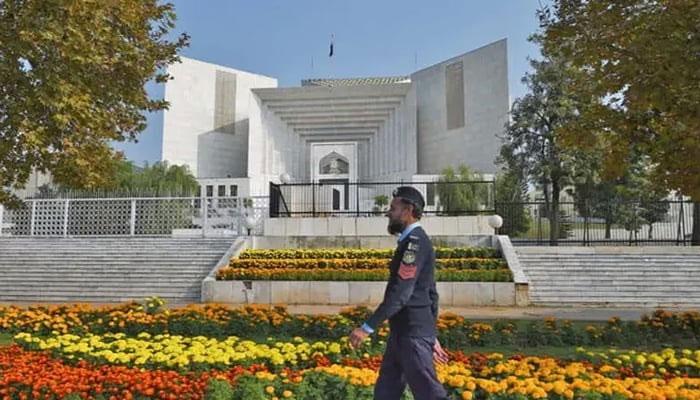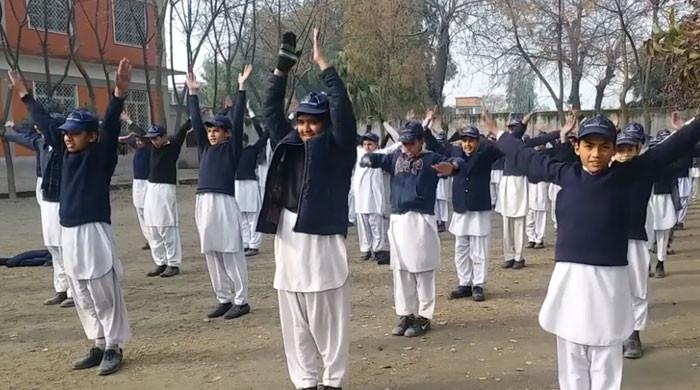 A policeman walks past the Supreme Court building in Islamabad, Pakistan. — AFP/File
A policeman walks past the Supreme Court building in Islamabad, Pakistan. — AFP/FileThe Supreme Court (Practice & Procedure) Act, 2023, — a law regulating the chief justice's powers — was passed by the former ruling coalition Pakistan Democratic Movement (PDM) towards the end of its government.
However, the alliance met with a setback as an eight-member bench constituted by former CJP Umar Ata Bandial issued a stay order on the law on April 13, days before its enactment on April 21.
Following the stay, four benches were constituted under Article 184(3) of the Constitution.
Two of these benches were a review bench constituted to hear the case of general elections all over the country on the same date, and a larger bench to hear the case of military trial of the civilians.
During the stay, now-CJP Justice Qazi Faez Isa and Justice Tariq recused themselves from hearing the civilians' military trial case as a verdict on the SC law hadn't been issued.
Moreover, the other two benches constituted during the stay included the SC bench in the audio leaks inquiry commission case.
CJP Isa headed this bench at a hearing on September 18, right after he took charge as the top judge. This bench has conducted three hearings so far.
It may be noted that no case under Article 184(3) has been fixed in the SC before the verdict on the SC (Practice and Procedure) Act 2023.
So, what is the law?
The law gave the power of taking sou motu notice to a three-member committee comprising senior judges including the chief justice. It further aimed to have transparent proceedings in the apex court and includes the right to appeal.
Regarding the constitution of benches, the Act stated that every cause, matter or appeal before the apex court would be heard and disposed of by a bench constituted by a committee comprising the CJP and the two senior-most judges.
It added that the decisions of the committee would be taken by a majority.
Regarding exercising the apex court's original jurisdiction, the Act said that any matter invoking the use of Article 184(3) would first be placed before the committee.
On matters where the interpretation of the Constitution is required, the Act said the committee would compose a bench comprising no less than five apex court judges.
About appeals for any verdict by an apex court bench that exercised Article 184(3)‘s jurisdiction, the Act said that the appeal would lie within 30 days of the bench’s order to a larger SC bench. It added that the appeal would be fixed for hearing within a period not exceeding 14 days.
It added that this right of appeal would also extend retrospectively to those aggrieved persons against whom an order was made under Article 184(3) prior to the commencement of the SC (Practice and Procedure), Act 2023, on the condition that the appeal was filed within 30 days of the Act's commencement.
The Act additionally said that a party would have the right to appoint its counsel of choice for filing a review application under Article 188 of the Constitution.
Furthermore, it states that an application pleading urgency or seeking interim relief, filed in a cause, appeal, or matter, shall be fixed for hearing within 14 days from the date of its filing.

 6 months ago
60
6 months ago
60





